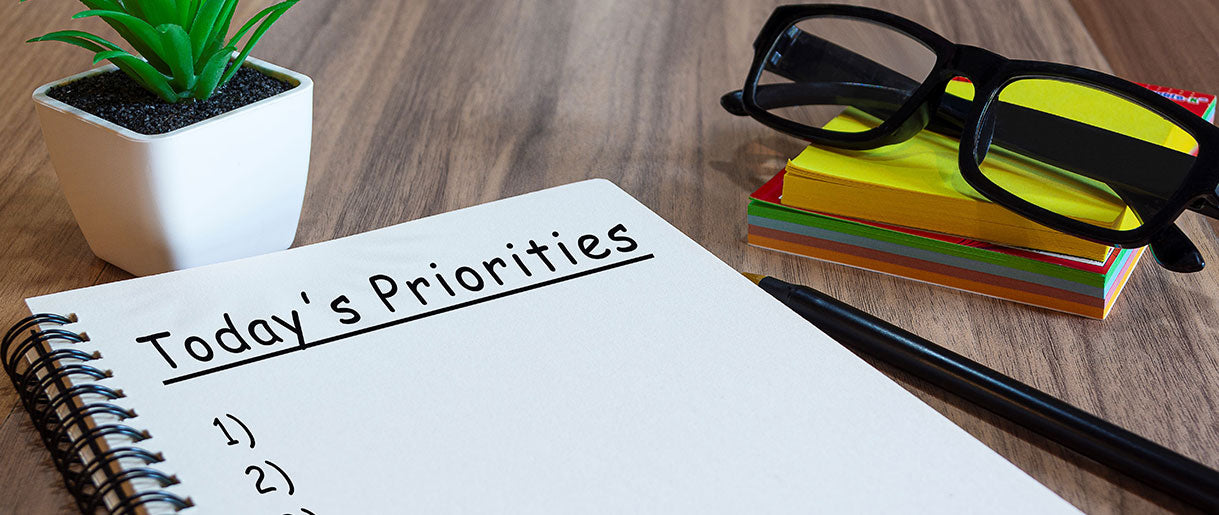Hey there, productivity seeker! Ready to turn your day from a haphazard collection of tasks into a well-orchestrated masterpiece?
It all starts with a simple yet powerful step: setting clear, achievable goals. These are your North Star, guiding you through the day's challenges and keeping you focused on what truly matters.
But goals alone aren't enough. To make the most of your time, you need to prioritize tasks based on importance and urgency.
It's like sorting your laundry—you wouldn't wash your delicates with your heavy-duty jeans, right? Same goes for your tasks. Tackle the most critical and time-sensitive ones first, and watch as your productivity soars.
Now, we know what you're thinking: "But what about those massive, daunting projects?" Fear not, ambitious one!
The secret is to break larger projects into manageable chunks. Just like eating an elephant (metaphorically, of course), you conquer big tasks one bite at a time.
But even the most dedicated productivity enthusiast needs a breather. That's why it's crucial to incorporate regular, short breaks to recharge.
Step away from your desk, stretch those legs, and give your brain a moment to reset. You'll come back refreshed and ready to tackle the next challenge.
Of course, distractions are the nemesis of productivity. To maintain your focus and flow, minimize distractions like unnecessary notifications, social media scrolling, and those tempting cat videos.
Let's dive in and explore the top 10 strategies that will help you make every hour count, every effort worthwhile, and every day a step closer to your dreams.
10 Productivity Hacks Successful People Use Daily
1. Set Clear Goals

Picture your day as a journey. Without a destination, how do you know where you're headed? This is where setting clear goals comes into play.
They are your destinations for the day, guiding you through a productive path and helping you focus on what truly matters. These goals are a productivity hack, one that delivers great results.
- Start with Specific Objectives: Vague goals can lead to vague results. Be specific. Instead of saying, "work on the project," define what aspect of the project you want to complete.
- Make Them Measurable: Ensure that your goals are measurable so you can determine when they've been achieved. For example, "Write 500 words of the report" gives you a concrete target to hit.
- Align Goals with Long-Term Objectives: Daily goals should feed into your larger objectives. This alignment ensures that every day brings you closer to your broader aspirations.
- Write Them Down: There's power in putting pen to paper. Writing down your goals helps you remember them and makes them feel more real and attainable.
- Review and Adjust as Needed: At the end of the day, review your goals. Celebrate the ones you've achieved and learn from the ones you haven't. This reflection is vital to continually refining your goal-setting skills.
Integrating goal-setting into your morning routine for success transforms your day from a random collection of tasks into a focused pursuit of clear objectives.
2. Prioritize Tasks

Embark on your journey to a productive day by mastering the art of prioritization. It's like setting up a roadmap for your day where you navigate through tasks not at random but with clear direction and purpose.
Prioritizing helps you focus and concentrate on what truly matters, ensuring that your energy and efforts are invested in the right places.
- Identify High-Impact Tasks: Begin by identifying tasks that have the most significant impact on your goals. Ask yourself, 'If I could only accomplish one thing today, what would it be?'
- Use the Eisenhower Matrix: This tool helps you categorize tasks based on urgency and importance. It's a simple yet effective way to visually sort what you need to do, delegate, schedule, or eliminate.
Incorporating task prioritization into your morning routine for energy sets the tone for a day where chaos is replaced with clarity.
This practice helps you cut through the noise of less important tasks, allowing you to channel your energies into accomplishing what truly drives your day forward.
3. Break Tasks Into Smaller Steps
A big, daunting task can feel like standing at the foot of a mountain. But what if you could turn that mountain into a series of manageable hills?
That's exactly what breaking tasks into smaller steps does. It makes even the most overwhelming tasks approachable, allowing you to tackle your day with confidence and clarity.
- Deconstruct Your Tasks: Look at an enormous task and break it into smaller, more manageable components. If you have a project, identify the individual steps needed to complete it.
- Set Mini-Goals: Each small step becomes a mini-goal. This approach makes the task seem less daunting and provides multiple opportunities for small victories throughout the day.
- Celebrate Small Wins: Every time you complete a step, take a moment to acknowledge it. These small wins build momentum and keep you motivated.
Incorporating this strategy into your morning routine for men or women transforms how you approach your tasks.
Instead of feeling overwhelmed by the size of a task, you gain control over it, tackling each part with focus and precision.
4. Use a Planner or To-Do List

Imagine having a personal assistant who keeps track of all your tasks, deadlines, and goals. That's essentially what a planner or to-do list can be for you.
It's a simple yet powerful tool that brings order to the potential chaos of your day, helping you stay focused, organized, and on track.
- Choose a Format That Works for You: Whether it's a digital app or a traditional paper planner, choose a format that you find easy and enjoyable. The right tool should fit seamlessly into your lifestyle.
- List Your Tasks: Write down everything you need to do. This act alone can reduce the anxiety of trying to remember tasks and allows you to see the bigger picture of your day.
- Prioritize Your List: Not all tasks are created equal. Mark your tasks by priority, using a system that works for you, like labeling them as high, medium, or low priority.
- Allocate Time Slots: Assign estimated time slots for each task. This helps create a realistic schedule and assists you in managing your time more effectively.
- Review and Update Regularly: Your to-do list is a dynamic tool. Review and update it throughout the day to reflect completed tasks and any new items.
Implementing a planner or to-do list into your daily routine is more than just keeping track of tasks; it's about taking control of your time. It allows you to visualize your day and allocate your resources effectively.
5. Minimize Distractions
In a world brimming with notifications, emails, and endless sources of entertainment, distractions are the arch-nemesis of productivity.
Taking control of these distractions can transform your day from fragmented and unproductive to focused and efficient.
It's about creating an environment where attention is not constantly pulled away from the task.
It is one of the most critical steps in entering the flow state, where all distractions fade, and you become laser-focused on the task.
- Identify Your Main Distractions: Start by recognizing what typically interrupts your focus. Is it your phone, social media, emails, or interruptions from others?
- Create a Distraction-Free Zone: Tailor your workspace to reduce these distractions. This could mean turning off notifications, closing unnecessary browser tabs, or setting up a quiet, dedicated work area.
- Set Boundaries with Others: If you work in a shared space, communicate your need for uninterrupted time to those around you. Sometimes, a simple sign or a conversation can set the necessary boundaries.
- Use Focus Tools: Consider using tools or techniques to help maintain focus. Apps that block distracting websites, noise-canceling headphones, or even a simple timer can be effective.
- Schedule Distraction Breaks: Allow yourself specific times to check your phone or social media. Knowing you have a designated time to indulge in these activities can make resisting temptation during work periods easier.
By minimizing distractions, you gift yourself uninterrupted periods where your productivity can peak.
6. Take Regular Breaks

Contrary to popular belief, non-stop work doesn't equate to peak productivity. The key to maintaining high efficiency throughout the day often involves taking breaks.
Regular, well-timed breaks can recharge your mind, boost creativity, and prevent burnout, keeping you sharp and focused.
- Embrace the Power of Short Breaks: Incorporate short, 5-10 minute breaks every hour or so. Use this time to step away from your work physically and mentally. It's a quick reset for your brain.
- Try the Pomodoro Technique: This popular time management method involves working for 25 minutes and then taking a 5-minute break. It's a structured approach that can help keep you on track.
- Engage in Different Activities: Do something unrelated to work during your breaks. Stretch, take a walk, listen to music, or simply relax. The idea is to give your mind a rest from work-related thinking.
- Make Breaks a Routine: Schedule your breaks like any other important task. Consistency in taking breaks can lead to more sustained focus during work periods.
- Mindful Breaks: Use your breaks for mindfulness or relaxation exercises. This can help reduce stress and improve concentration when you return to your tasks.
Incorporating regular breaks into your workday is like giving your brain the necessary breathing space.
It's a moment to rejuvenate and prepare for the next round of productive work.
7. Stay Hydrated and Eat Healthy
Think of your body as the engine that powers your day. Just like any engine, it needs the right fuel to run efficiently.
Staying hydrated and eating healthy are not just good health practices; they are crucial for keeping your energy levels up and your mind sharp, directly impacting your productivity.
- Keep Water Handy:Always have a water bottle at your desk or workspace. Regular sips can prevent dehydration, which often manifests as fatigue and decreased concentration.
- Balanced Meals are Key: Aim for well-balanced meals that mix proteins, healthy fats, and complex carbohydrates. These nutrients provide sustained energy, keeping you full and focused for longer.
- Snack Smart: Choose snacks that boost brain power and energy. Options like nuts, fruits, yogurt, or whole-grain crackers are excellent for a quick, healthy pick-me-up.
- Avoid Sugar Highs and Lows: Be cautious of foods high in sugar. They might give a quick energy spike, but this is often followed by a sharp crash, leaving you sluggish and unfocused.
By prioritizing hydration and healthy eating, you're setting yourself up for a day of high productivity. It's about giving your body and brain the nourishment they need to function at their best.
8. Exercise and Move Regularly

Integrating exercise and regular movement into your day isn't just about physical health; it's a powerful catalyst for productivity.
Regular physical activity, even in short bursts, can boost your brainpower, enhance your mood, and increase your energy levels, all of which contribute to a more productive day.
- Incorporate Morning Exercise: Starting your day with morning exercises for energy, whether a brisk walk, a yoga session, or a quick workout, can wake your body and mind, preparing them for the day ahead.
- Deskercise: For those with sedentary jobs, try incorporating small exercises at your desk. Stretching, desk yoga, or standing periodically can make a difference.
- Take Active Breaks: Use your breaks to add some movement. A short walk, quick stairs, or light stretching can re-energize you for the next work session.
- Make It Enjoyable: Choose a form of exercise that you enjoy. When you look forward to something, it's easier to make it a regular part of your routine.
- Lunchtime Movement:Use part of your lunch break for some quick physical activity. A walk outside can also provide a change of scenery and a dose of nature.
Regular movement and exercise during the day help keep both your body and mind alert and active.
It's not just about the physical benefits; it's about clearing your mind, reducing stress, and bringing a fresh perspective to your tasks.
9. Reflect and Adjust
The secret to a truly productive day often lies in doing, reflecting, and adjusting. Taking time to pause and evaluate your day's work lets you understand what's working well and what needs tweaking.
This process of reflection and adjustment is key to continual improvement and sustained productivity.
- Set Aside Time for Daily Review: Dedicate a few minutes to review what you accomplished at the end of your day. This can be a time of quiet reflection or a structured evaluation of your to-do list.
- Assess Your Achievements and Challenges: Look at your completed tasks and identify any challenges you faced. Understanding your hurdles is the first step in overcoming them.
- Learn from Your Experiences: Each day offers valuable lessons. What strategies helped you be productive? What distractions did you encounter? Use these insights to refine your approach.
Incorporating a regular practice of reflection and adjustment into your routine helps transform your approach to work and productivity.
It's about evolving and adapting, ensuring that you're not just busy but effectively moving towards your goals each day.
10. Practice Self-Care

In pursuing a productive day, it's crucial not to overlook the importance of self-care. Taking care of your mental and physical well-being is the foundation upon which productivity is built.
Self-care isn't a luxury; it's a vital part of a routine that enables you to work efficiently and sustainably.
- Mind Your Mental Health: Allocate time for activities that reduce stress and boost your mental health—if necessary, adopt a morning routine for mental health. Include activities like meditation, reading, pursuing a hobby, or simply enjoying a quiet moment of relaxation in this routine.
- Physical Well-being: Pay attention to physical signs of stress or fatigue. Regular exercise, adequate sleep, and proper nutrition are crucial to preparing your body for the day's challenges.
- Set Boundaries: Establish clear boundaries between work and personal time. This helps prevent burnout and ensures that you have time to recharge.
- Social Connections: Make time for social interactions, whether it's with family, friends, or colleagues. Positive relationships are crucial for emotional support and can provide a much-needed break from work.
- Listen to Your Body and Mind: Be attuned to your body and mind's needs. Sometimes, the most productive thing you can do is take a step back and rest.
Incorporating self-care into your daily routine ensures you're productive but also happy, and healthy in the long run.
FAQs About How to Have a Productive Day
Why Do I Feel So Unproductive Even When I'm Busy All Day?
This is a common concern many people face. Being busy doesn't always equate to being productive.
Getting caught up in tasks that seem urgent but may not be necessary in the grand scheme is easy.
It's vital to differentiate between merely being busy and making meaningful progress. Reviewing and prioritizing your tasks can help ensure you focus on activities that align with your goals.
How Long Should I Work Before Taking A Break For Maximum Productivity?
The optimal work-to-break ratio varies for everyone, but a popular method is the Pomodoro Technique. This suggests working intensely for 25 minutes and then taking a 5-minute break.
After four cycles, take a longer 15-30 minute break. Research indicates that regular short breaks can help maintain high levels of focus and give your brain a brief respite to recharge.
Can Multitasking Improve My Productivity?
It's a common misconception that multitasking can help get more done in less time. In reality, multitasking can reduce the quality of your work and make tasks take longer.
Our brains are wired to focus on one task at a time. Juggling multiple tasks can cause more errors, increased stress, and decreased overall productivity. It's more effective to prioritize and tackle tasks one at a time.
Key Takeaways
There you have it—a comprehensive blueprint to transform your days and life. We all have the same hours in a day, but how we utilize those hours sets us apart.
Remember, productivity isn't about cramming every second with tasks but making each moment meaningful and purpose-driven. As you integrate these strategies into your daily life, you'll see tasks ticked off your list faster and feel renewed energy and fulfillment.
But here's the most critical part:Begin. Whether it's the Big Rock approach, the 3-minute reset, or embracing the art of the 'Not-To-Do' list, the key is to start somewhere. You're on the brink of building days you look forward to, days that feel accomplished, and nights that wrap up with contentment.
Have you tried any of these strategies? Do you have a unique productivity tip of your own? We're all ears! Dive into the comments below and share your insights. Let's learn, grow, and hustle smarter together. Remember, every productive day is a stepping stone towards a successful life. So, here's to creating more of those!🚀📈🌟










Let Us Know Your Comments